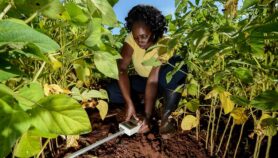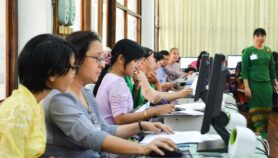Send to a friend
The details you provide on this page will not be used to send unsolicited email, and will not be sold to a 3rd party. See privacy policy.
Government attempts to control science communication clash with public demands for accountability, and journalists must resist this trend.
Until recently, distrust has been the biggest obstacle preventing scientists interacting with journalists in the developing world. Scientists have feared — often with justification — that they will be misquoted and their work misrepresented by journalists who do not understand the technical details.
This has resulted in a frequent reluctance even to grant interviews. "Go away and read my paper" has too often been scientists’ response to journalists seeking information about their work.
Fortunately, this is now changing. Scientists are becoming more willing to come out of their ivory towers. In Malaysia, for example, researchers are encouraged to be more open about their research and its implications as part of their funding contract.
Journalists, in turn, are becoming more professional in their approach, supported by initiatives such as the SjCOOP training programme of the World Federation of Science Journalists.
But the old barriers to communication are being replaced by a new one: efforts by governments and institutions to control the content of the communication process. This was one of the key messages of the highly successful World Conference of Science Journalists held in Doha, Qatar, last week.
As journalists increase their skills in seeking out ‘the news behind the news’, governments and research institutions are responding by placing obstacles in the way of reporters who, correctly, see their role as more than reproducing press releases or official statements.
The challenge ahead for science journalists is to contest this trend, which conflicts directly with public demands for transparency and accountability — demands fuelled by the growing popularity of social media.
Access denied
Transparency and accountability in the way that scientific knowledge is generated, used and distributed is essential at a time when tackling so many of the world’s problems, from climate change to food security, requires decisions made on robust evidence.
Science journalists have a key role in ensuring that this happens. They can also help remove obstacles that prevent the transparent use of scientific information, for example by highlighting occasions when their access to information has been blocked, or by pushing for legislation that makes transparency a requirement for public funding.
Sadly, participants in last week’s meeting heard of several instances in which journalists were denied access to scientists in the course of their work.
Richard Stone, for example, the Asia news editor of the journal Science, told delegates how local government officials in the Chinese province of Yunnan barred him from speaking to researchers studying an unexplained disease — known as Yunnan Unknown Cause Sudden Death — even though he had been granted permission by the national government in Beijing.
There were more stories from journalists working in other countries. In Egypt, journalists have been told not to make direct contact with scientists despite having a proven track record of accurate reporting.
The problem is not restricted to developing countries. Several science journalists reported difficulties in getting technical information from the Japanese government about the damage to the nuclear plant at Fukushima after the tsunami hit the country’s northeast coast.
And in Canada, new rules have been introduced restricting the access of journalists to government scientists. Journalist Margaret Munro said that climate change scientists can no longer speak freely to the media, and gave examples of cases where journalists had their interviews recorded by press officers, after obtaining their consent.
Press freedom
Restrictions imposed for credible reasons of national security are clearly appropriate. The same is true when commercial confidentiality is at stake.
But attempting to gag scientists who may be critical of government policy or report findings that may prove embarrassing to government officials is a different issue.
Some speakers at the Doha meeting, including Stone, suggested that journalists counter these restrictions by avoiding official channels of communication, such as press officers, and contact scientists directly. This is now easier than ever before, with email and mobile telephones.
This is, however, an extreme solution. It may provide the information that a journalist is seeking, but it puts scientists at risk, particularly when they are being officially discouraged from talking to the media. And it can only exacerbate tensions between research institutions, government agencies and the science journalists who cover their activities.
A long-term solution requires governments to accept that transparency in all their affairs — including the work of their scientists — is essential for the effective functioning of a modern democracy. The press must also accept that it has a responsibility to use this transparency wisely.
And scientists can add their weight to journalists seeking the lifting of excessive restrictions, both within their institutions and at a political level.
Last week’s meeting was moved from Cairo to Doha because of continuing uncertainties over the recent unrest in Egypt. And delegates were constantly reminded that what united the protesters in Tahrir Square was a common commitment to greater accountability by the Egyptian government.
There were also reminders that developed and developing countries alike have had to fight, over many centuries, for the prized commitment to the freedom of the press that helps to make this greater accountability possible.
The next conference, to take place in Helsinki, Finland, in two years’ time, will, in the words of its organisers, include an exploration of the work of science journalists around the world "in the light of the Enlightenment-period notions of critical questioning and the public sphere".
This will be an excellent opportunity to explore in greater detail how vital it is for science journalism that governments respect the free flow of scientific information. It will also be an opportunity to take stock of the pressures that prevent this from happening, and the steps that are needed to resist them.
David Dickson
Editor, SciDev.Net













